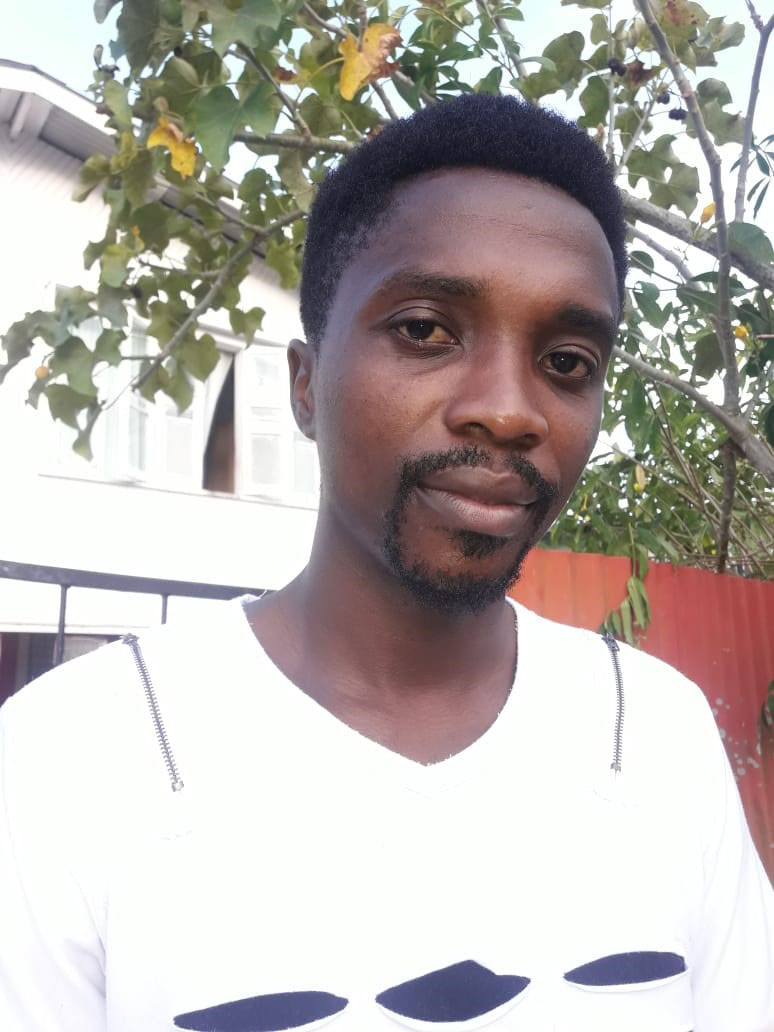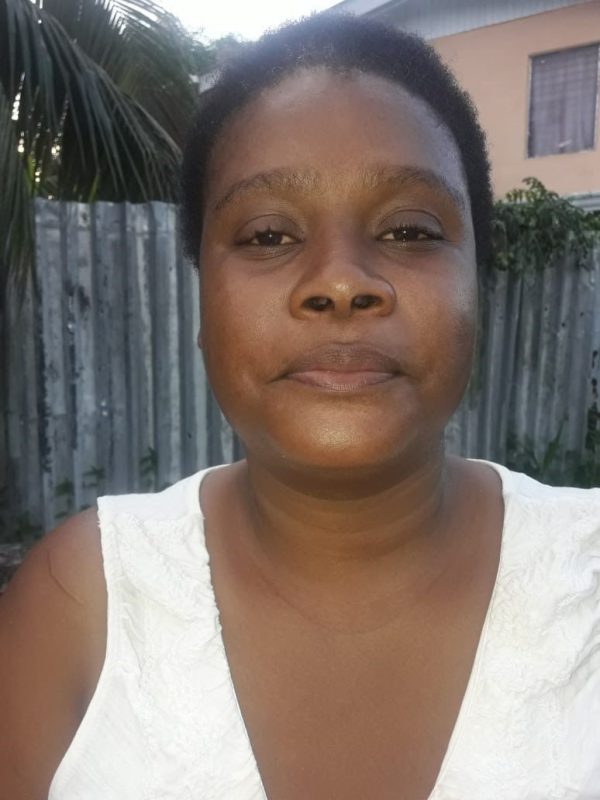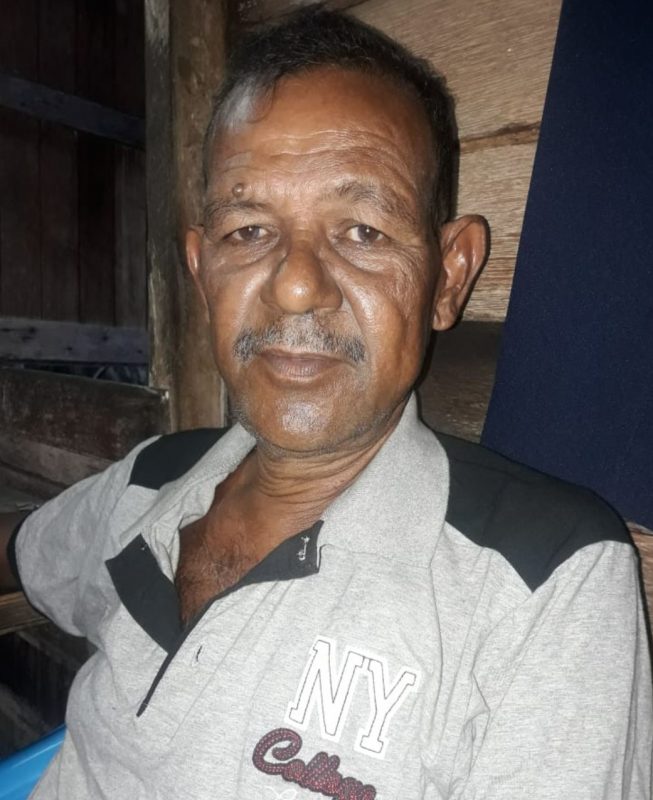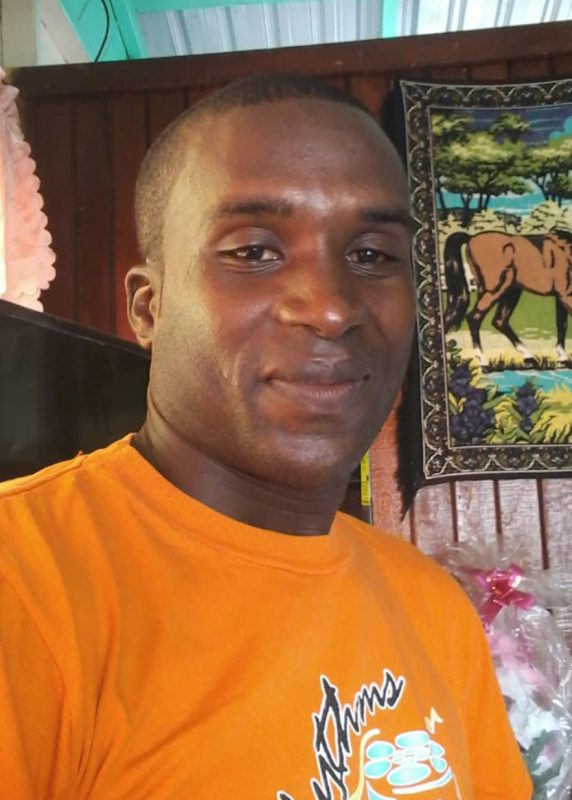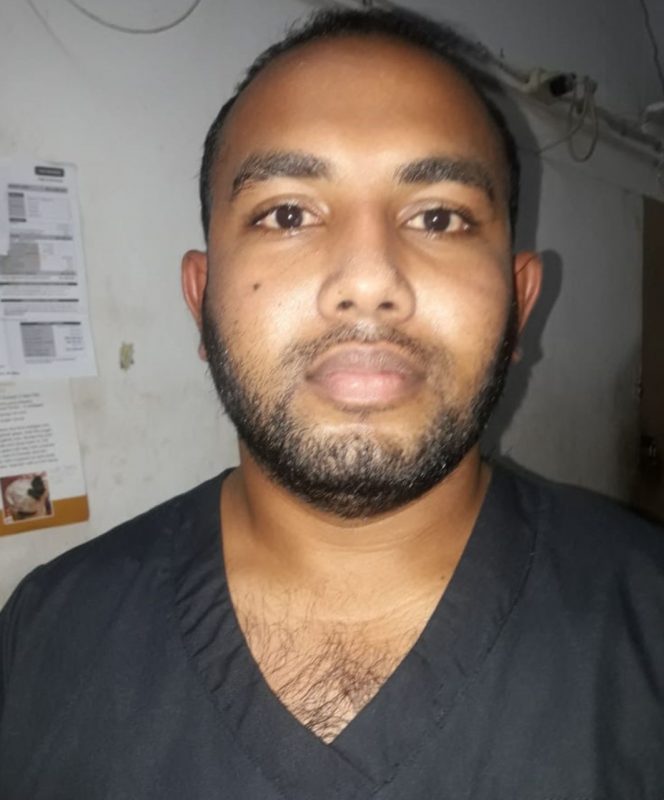Almost half a year since the pandemic lockdown, families are still struggling to put food on the table and while a COVID-19 vaccine could be a major breakthrough, there is skepticism as it relates to possible side effects.
When Stabroek News reached out to residents of New Scheme, Patentia, many were still grappling with the impact of the worldwide crisis, some were still without steady jobs as well as being the sole breadwinners of their homes.
Naresh Mathur is an unemployed 50-year-old resident who has a wife to support. His children are all grown and living abroad. He says his struggles began several years ago after working out of his mobile shop for a number of years. Business started to slow down and he came to the conclusion that it was too much of a risk investing financially and not making a proper profit at the end of the day. He decided to park his truck three years ago then later, he made the decision to sell his vehicle. Since then he has been relying on whatever savings he had as well as the support of his children.
Speaking on the COVID vaccines possibly coming to Guyana, Mathur said he has no desire to be vaccinated and instead prefers to wait until after a number of persons have volunteered here to give it a try. Once it works, then he’ll consider being vaccinated.
In the meantime, he looks forward to moving abroad to be with his children and is awaiting the completion of the process at the US Embassy which also has been slowed by the pandemic.
“I was laid off from work. I was an operator at Gafoor’s at the McDoom location. It has been a bit tough since I’ve been home for three months now,” said Kevin Michael. He is expected to return to work later this month as the company has already reached out to him to restart in the coming weeks.
Since he’s been without his job, the young man has tried to ‘catch his hand’ doing masonry. Even this, he said, has slowed down as persons are taking extra caution to save as well as adhere to social guidelines. As of this week he has no construction jobs lined up for him but noted that there should be one for next week.
According to Michael, he understands the need for persons to follow the COVID-19 guidelines explaining that he makes sure he uses his face mask and hand sanitiser whenever he is travelling. He said he also avoids gatherings of any kind.
“I’m a bit skeptical when I hear about this vaccine. I would want to think that Russia is using us as lab rats since we are considered a third world country,” Michael opined about reports about a Russian vaccine soon to be on the market.
An agricultural science teacher at Patentia Secondary School, Roger Henry, acknowledged that he is affected by the pandemic socially and mentally. “I get frustrated from time to time because I have nothing to keep me gainfully occupied. Socially I can’t link with my friends. I have a son to take care of as well. Prior to the pandemic he had school for half of the day. Teachers were sending work on WhatsApp for parents to work with the children,” Henry said. His son has already been registered to attend the primary school.
“I’m not too sure about the vaccines and the side effects that they come with but maybe as time progress, and I see that persons are not in danger then maybe I’ll try it also. I need evidence,” stated the teacher.
“I had a little job and because of COVID, I get send home from the job. It has affected me a great lot and from since then to now I haven’t gotten no help in no way,” Mary Bradford said.
A single mother of three children, the woman worked as a domestic help but since the start of the pandemic has been without a job and reliant on her parents and her sister. “Many people come around and they sign me up for this COVID-relief but we haven’t received any hampers or anything as yet. I hear that some areas are getting but for us living through this squatting area here, nobody is helping us,” she pointed adding also that the $25,000 COVID-relief per household that was recently announced by President Irfaan Ali, though not much, will help to take care of her bills.
For Bradford, once all the necessary protocols are followed as it relates to the COVID vaccine before persons are vaccinated and she is sure that there are no side effects or are temporary and mild, then she will not be as hesitant to take it.
Looking for a job
Chaunza Bernard, sat outside her yard with her son. She had gone looking for a job earlier in the day but was unsuccessful. Prior to COVID-19, she worked as an assistant cook at a food shop in D’Urban Street, Georgetown. Asked how it was that she was let go when food shops would be considered essential businesses, Bernard explained that sales had fallen. She along with four other assistant cooks who were recently employed before the pandemic were all let go.
“We’re surviving by the grace of God. I go and strip broom and sell calaloo [eddo leaf] at Stabroek Market on the weekends. Two weeks after I get send home, I started doing this because I couldn’t sit down and keep wondering where we’ll get food from,” said the single mother of five. Sometimes the father of her children provides financial support, but not as often as needed.
Bernard says “No” when it comes to taking the vaccine, adding that she and her children will continue to do social distancing and trust that her bush medicines will also help in the fight against the virus.
Though he did not lose his job as a result of the pandemic, Ryan Ranglall has also felt the brunt of it. Ranglall works as an acting supervisor at Gafoor’s. For several months he had to deal with the rotation system which saw him working three days a week instead of his regular six. This of course meant that his salary was cut in half. His parents are old-age pensioners. They have been trying to brace each another financially through the pandemic. “It wasn’t good, the rotation. Half month money wasn’t making sense,” he said.
“I am relieved about us getting a vaccine. I will be taking the vaccine if it comes here,” said Ranglall.
“The vaccine is no problem to take it but we ain’t sure if it gonna work on we. I want to know that it working before we take it,” declared Annet Sandy, another single parent.
A shopkeeper of a ‘bottom-house’ business, Sandy noted that she is doing all she can to avoid contracting the virus. She pointed out a clear plastic sheet in the front of the shop to keep distance between herself and customers. Speaking of customers, she related that sales have decreased, making it difficult to maintain herself and her eight children.
Five of her children are of school age. She understands the importance of school going virtual but lamented that she is worried for her children’s education as they have no devices with which to learn on. Sandy is appealing to the government to assist her so that her children will not be denied an education. “If they should go ahead and give us the $25,000, I will try to make much of it and be thankful,” assured Sandy.
She further appealed, “Come around at our section and see how we are making out. We have about ten families in this street alone. We hearing that the government sharing, but we don’t get. I don’t think this has much to do with the government like it has to do with the people who are the ones sharing out the hampers. They [the government] up there, they don’t know about us.”
Tailor, Frankie Singh, sat in his shop looking out. Several head ties made into face masks and packaged in plastic hung in front of his shop. “No business ain’t doing. My peak season is the school time and sometimes Christmas time. We had the starting of two school terms so far and no business,” lamented Singh.
Asked how he is making out, the tailor explained that customers may not be coming to him to make an entire outfit but they are coming from time to time for him to alter a piece of clothing. He doesn’t make much of anything on his face masks either, explaining that his few customers are persons living in the villages beyond: Vriesland, Vive-La-Force, and Free and Easy. These persons, he noted, are those heading to Vreed-en-Hoop and need to wear a face mask.
Of the vaccines he said, “I’m willing to take it as long as the vaccines are working. I feel good about it.”
“From the time this pandemic started in March, all the work hold up. Since then I haven’t been getting much jobs because whatever little money people trying to spend, they trying to hold on to it because of the uncertainty of the pandemic as well as the elections,” said Kurt Lindo, a mason.
Prior to the lockdown, Lindo shared that he worked on a regular basis, as much as six, sometimes seven days a week. Now he works one or two days a week. He has no work set up for this week and didn’t have work for last week either.
Lindo’s family rears cows and poultry but nothing is selling now except for several pints of cow’s milk here and there. His parents, both in their seventies, try to assist him with their old-age pension when it comes to handling the bills.
According to Lindo he was doing a heavy-duty machinery course at GITC (Guyana Industrial Training Centre) which he did for three months but had to stop because of the pandemic. Classes restarted last month but students are attending in smaller groups to allow for social distancing.
“I saw a post on Facebook the other day about the vaccine and I was showing my mother. According to the post, a label on the vaccine showing that the vaccine is prohibited in the EU, the US, and Canada was removed and I was wondering if they won’t use it there, why use it on us. I want to know if the first-world countries won’t use it where there is better medical facilities that can better deal with anything that goes wrong, then why must we use it? Something is not adding up”, said a skeptical Lindo.
Vishal Kanhai is the pharmacist at the pharmacy in the community and at the Woodlands Hospital. He related that while the pandemic has increased sales for the family-owned pharmacy, it has been the opposite for the hospital since people have been staying away from hospitals to avoid contracting the coronavirus.
“People are afraid to come out to the hospitals because of COVID-19. They are afraid of being tested and possibly testing positive and then they will have to be in isolation,” Kanhai explained. And while his salary hasn’t been affected, the overall sales at the hospital, he disclosed, has been.
Asked how he stays safe working at a hospital of all places, the pharmacist noted that hospital staff are attired in face masks, gowns, gloves and sanitise before and after each patient.
A signboard at his village pharmacy requests that persons wear face masks but several of the customers he had been attending to at the time, wore none. Kanhai explained that despite the advice to wear face masks, some persons are not doing so and would complain about not being able to breathe properly. He feels that they are not too concerned because they may be saying to themselves that Region Three is not severely affected as Region Four and several other regions. He’s hoping they will change this mindset soon.
As it regards the COVID-19 vaccine, Kanhai says, “If it’s FDA (US Food and Drug Administration) approved and clinically tested, I won’t be worried about taking it. Being clinically tested is important. To be clinically tested simply means that there were trials where persons were tested. As long as it worked and the reviews are positive, that’s it for me.”
